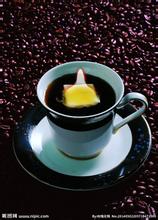The unusually fruity Hawaiian Kona coffee introduces fine coffee.
Although Hawaii is often affected by tornadoes, the climatic conditions are very suitable for the coffee industry. There is plenty of rain and sunshine here, and there is no worry of frost. In addition, there is a strange natural phenomenon called free shade (freeshade). On most days, at about two o'clock in the afternoon, white clouds appear in the sky, providing the necessary shade for the coffee trees. In fact, it is such excellent natural conditions that make the Arabian varieties of coffee in Kona produce more than any other plantation in the world, and always maintain high quality. For example, it produces 560,900 hectares per hectare in Latin America and 2240 kilograms per hectare in Kona. To the displeasure of coffee fans, only about 1400 hectares of coffee are produced.
Real Kona coffee is indeed a treasure in the world and is not easy to find. The best Kona coffee is divided into Extra Fancy, Fancy and Number One. This third-class coffee is produced on manors and under natural conditions. Most of the coffee that calls itself "Kona" now contains less than 5% of the real Hawaiian Kona coffee. Another true Hawaiian coffee can be found in the United States-Hawaii Kaj Farm Coffee (Kai Farms). Hawaii's coffee industry has to compete with the growing tourism industry. Most coffee is grown on the slopes of Mauna Loa. Mauna Loa was originally a volcano located in the western part of the Kona region on the island of Hawaii. The coffee producing area is about 30 kilometers long and its growing areas are mainly concentrated in the north and south of the area. Coffee trees are planted in relatively desolate areas, but their soil is fertile and contains volcanic ash. Although it takes a lot of physical labor to start planting and it is difficult to manage, it is reassuring that Kona's coffee trees (at least those growing above 90 meters above sea level) seem to be unaffected by any diseases and insect pests. Kona coffee beans made in Hawaii have the perfect appearance, their fruit is unusually full and shiny. The taste of coffee is rich and aromatic, with cinnamon flavor, and the acidity is well balanced.
Hawaiian coffee is the only top variety produced in 50 states in the United States, and the United States is naturally its largest market.
Of all the coffee producers, Hawaii has the strictest management of the coffee industry, the highest labor costs and the best level of investment.

Important Notice :
前街咖啡 FrontStreet Coffee has moved to new addredd:
FrontStreet Coffee Address: 315,Donghua East Road,GuangZhou
Tel:020 38364473
- Prev

Venezuelan coffee flavor producing areas introduce boutique coffee San Cristobal
The coffee produced in Venezuela is different from other coffee in Latin America. It tastes delicious, sour and has delicious fruit. This kind of coffee is most suitable for medium to deep roasting, which can not only be mixed but also has its own characteristics. Most of the country's coffee is exported to Russia, Colombia and other places, and some small plantations export coffee on their own. Among the many industries, Venezuela's
- Next

Cuban crystal coffee with even taste introduces fine coffee.
Cuba is an island of the Caribbean, and its whole territory is in the international coffee belt. The province of Santiago, Cuba's most important coffee producer, is no more than 200 kilometers away from Jamaica. In 1748, a French colonist named JoseAntonioGelabert began to grow coffee in Cuba. Soon, it became popular to enslave slaves in this land to grow coffee on a large scale. For more than a hundred years
Related
- Does Rose Summer choose Blue, Green or Red? Detailed explanation of Rose Summer Coffee plots and Classification in Panamanian Jade Manor
- What is the difference between the origin, producing area, processing plant, cooperative and manor of coffee beans?
- How fine does the espresso powder fit? how to grind the espresso?
- Sca coffee roasting degree color card coffee roasting degree 8 roasting color values what do you mean?
- The practice of lattes: how to make lattes at home
- Introduction to Indonesian Fine Coffee beans-- Java Coffee producing area of Indonesian Arabica Coffee
- How much will the flavor of light and medium roasted rose summer be expressed? What baking level is rose summer suitable for?
- Introduction to the characteristics of washing, sun-drying or wet-planing coffee commonly used in Mantenin, Indonesia
- Price characteristics of Arabica Coffee Bean Starbucks introduction to Manning Coffee Bean Taste producing area Variety Manor
- What is the authentic Yega flavor? What are the flavor characteristics of the really excellent Yejasuffi coffee beans?

